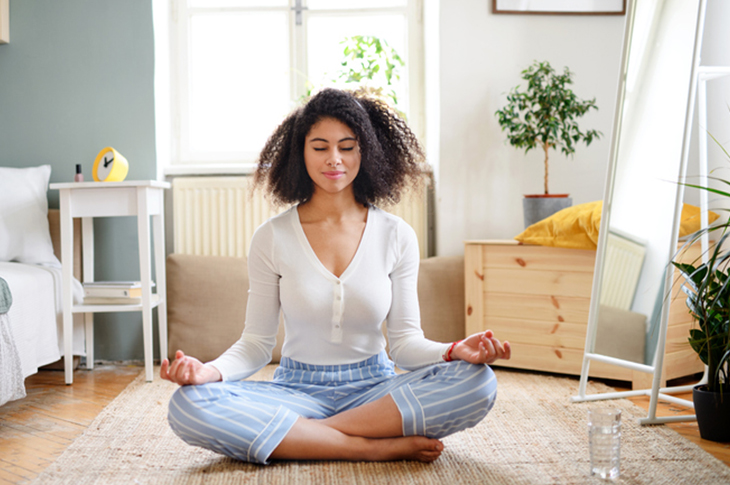Everyone deserves to let loose and have a fun night out every so often. But if your fun night out includes tossing back a few cocktails, there’s a chance that you may wake up the next day with a hangover—and with the post-drinking anxiety, better known as “hangxiety”, that goes along with it.
If you’ve ever woken up with a case of hangxiety, you know that it can completely ruin your day. So the question is, how can you overcome hangxiety after a night out, and start feeling better as soon as possible?
What is hangxiety, and what causes it?
First, let’s quickly cover what, exactly, hangxiety is—and what’s happening in your brain and body that causes it.
Hangxiety refers to the experience of anxiety many people have after a night of moderate or heavy drinking—and it’s a byproduct of a hangover. In addition to anxiety, “[hangover] symptoms can include fatigue, severe headache, poor coordination, difficulties concentrating, and generalized malaise,” says board-certified addiction medicine specialist Dr. James Pratty, MD, Medical Director of Psychiatry and Behavioral Health for health plan Brand New Day.
There are a few things happening that contribute to hangxiety, starting with a drop in the neurotransmitter serotonin, which regulates mood. “Since alcohol can affect the level of serotonin in the brain, it can change your mood,” says Dr. Deena Manion, PsyD, LCSW, and Executive Director of Westwind Recovery in Los Angeles. “[Serotonin] increases while drinking, but comes down quickly after drinking—and can cause feelings of anxiety and depression as a result.”
Changes in blood sugar and hydration level can also contribute to hangxiety. “You can have a drop in blood sugar after drinking, which can cause anxiety and feelings of nervousness,” says Manion. “Drinking can [also] dehydrate you, which can mimic anxiety-like symptoms.”
In addition to the physiological contributors to hangxiety, what happens during and after your night out can also make you feel anxiety the next day. “Sleep deprivation can also contribute to irritability and anxiety,” says Irwin.
Symptoms typically resolve within a day. “‘Hangxiety’ can last 14 to 16 hours—and even up to 24 hours—after the first hangover symptoms,” says Manion.
Clearly, this is not a pleasant experience. So what can you do about it? Let’s take a look at some expert-recommended strategies you can use to start feeling better.
Take a deep breath
Some of the symptoms of hangxiety are actually physiological responses—or, in other words, changes in the way your body functions. “The symptoms of anxiety are different for each person, but they almost always include rapid breathing and an increased heart rate,” says Manion.
And when you’re dealing with these types of symptoms, one of the best things you can do? Take a deep breath. “Deep or rhythmic breathing is a good way to decrease symptoms of anxiety,” says Manion.
Deep breathing activates the body’s parasympathetic nervous system (aka “rest and digest”), which can help to lower your heart rate and blood pressure and make you feel more calm. So, if your hangxiety comes packaged with a racing heart or shallow breathing, carving out a few minutes to do a few deep breathing exercises (like box breathing or the 4-7-8 breath) can be exactly what you need to calm down and start feeling less anxious.
Try mindfulness meditation
Research has shown that mindfulness practices significantly reduce stress and anxiety. So, if you’re looking to shake off your hangxiety after a night out, mindfulness meditation is a strategy you’ll definitely want to consider. “Any meditation or mindfulness meditation that can calm the mind and body is a great way to reduce anxiety-related symptoms,” says Manion.
Mindfulness meditation is simple. Sit down in a chair and close your eyes. Breath in and out through your nose. (You can breathe naturally or, if it’s more helpful, you can inhale for a count of five and then exhale for a count of five). Focus on your breath as it moves in and out of your nose. If you find your mind wandering, simply pull your attention back to your breath.
Start with five minutes of meditation—and, as you gain more experience, aim to get to 20 minutes of meditation at a time. If you’re brand new to meditation, a Premium guided meditation can help you get into the zone!
Rest and rehydrate
As mentioned, both exhaustion and dehydration can be major contributing factors to hangxiety. That means it’s important to rest and rehydrate.
If you can, take it easy the day following a night of drinking. Aim to drink plenty of water, and also try to avoid any beverages that could dehydrate you. (We’re looking at you, coffee!)
Embrace your favorite anxiety-busting activity
Everyone has different ways of dealing with anxiety. So, if you have a particular activity that helps you feel less anxious, this is a great time to participate in that activity. “Try to be gentle with yourself and do things that bring you joy,” says Manion.
For example, according to Irwin, “Walks in nature, playing with pets, [or] anything creative…can ground you and settle your anxiety.” Or, if that’s not your cup of tea, you might cuddle up on the couch with your favorite movie, call a loved friend or family member for some words of encouragement, or spend time hanging out in your backyard.
The point is, if there’s something that reliably helps you manage feelings of anxiety, that something should also help you manage feelings of hangxiety—so prioritize doing that something.
Talk to a professional
Hangxiety can happen to everyone. But if you find that you’re experiencing hangxiety on a regular basis and are starting to feel concerned about your drinking, you may want to consider talking to a professional (like a doctor, therapist, or addiction specialist). They can help you identify what’s really going on—and help you make a plan to get it under control.
The post How to Overcome “Hangxiety” After a Night Out appeared first on Fitbit Blog.



